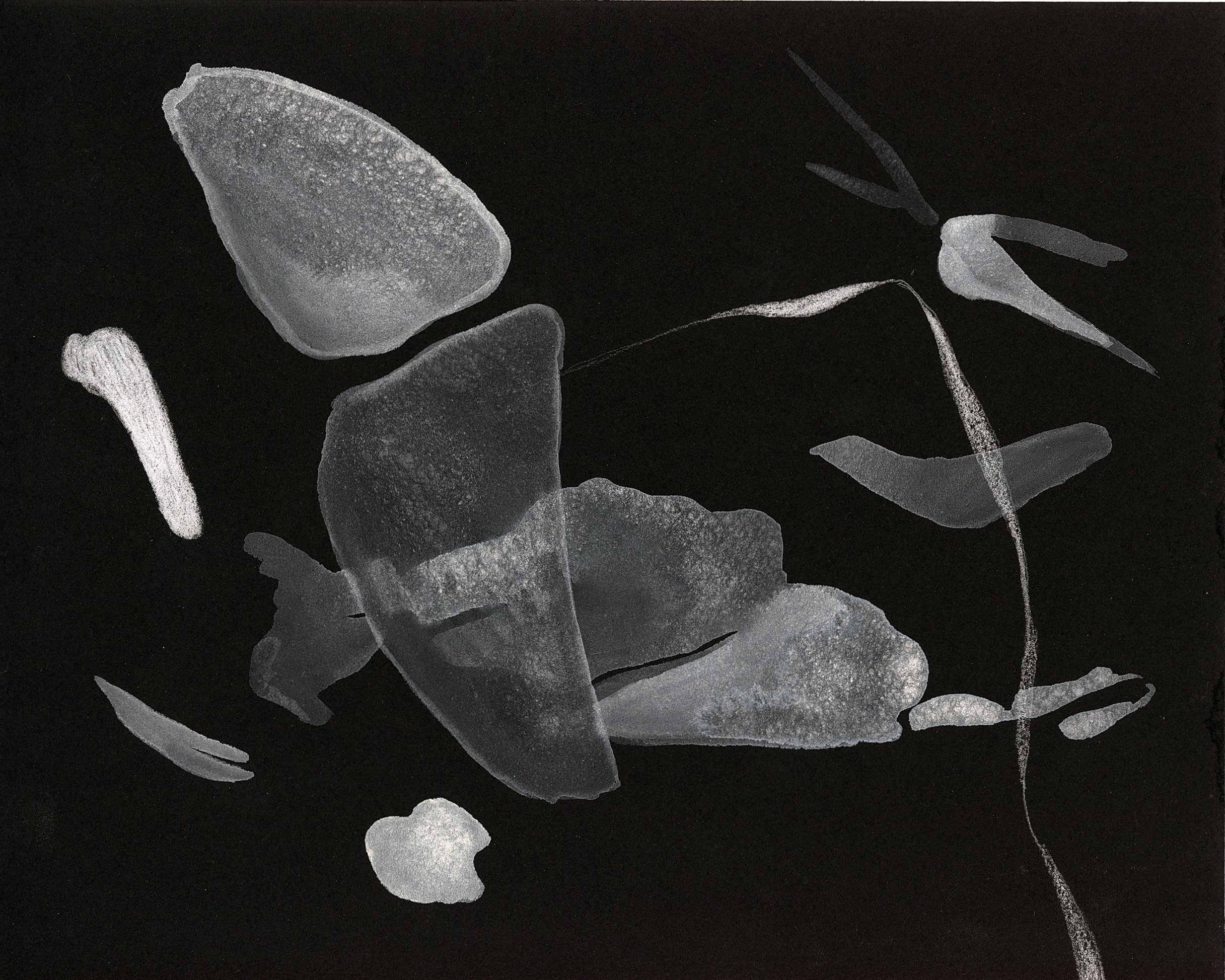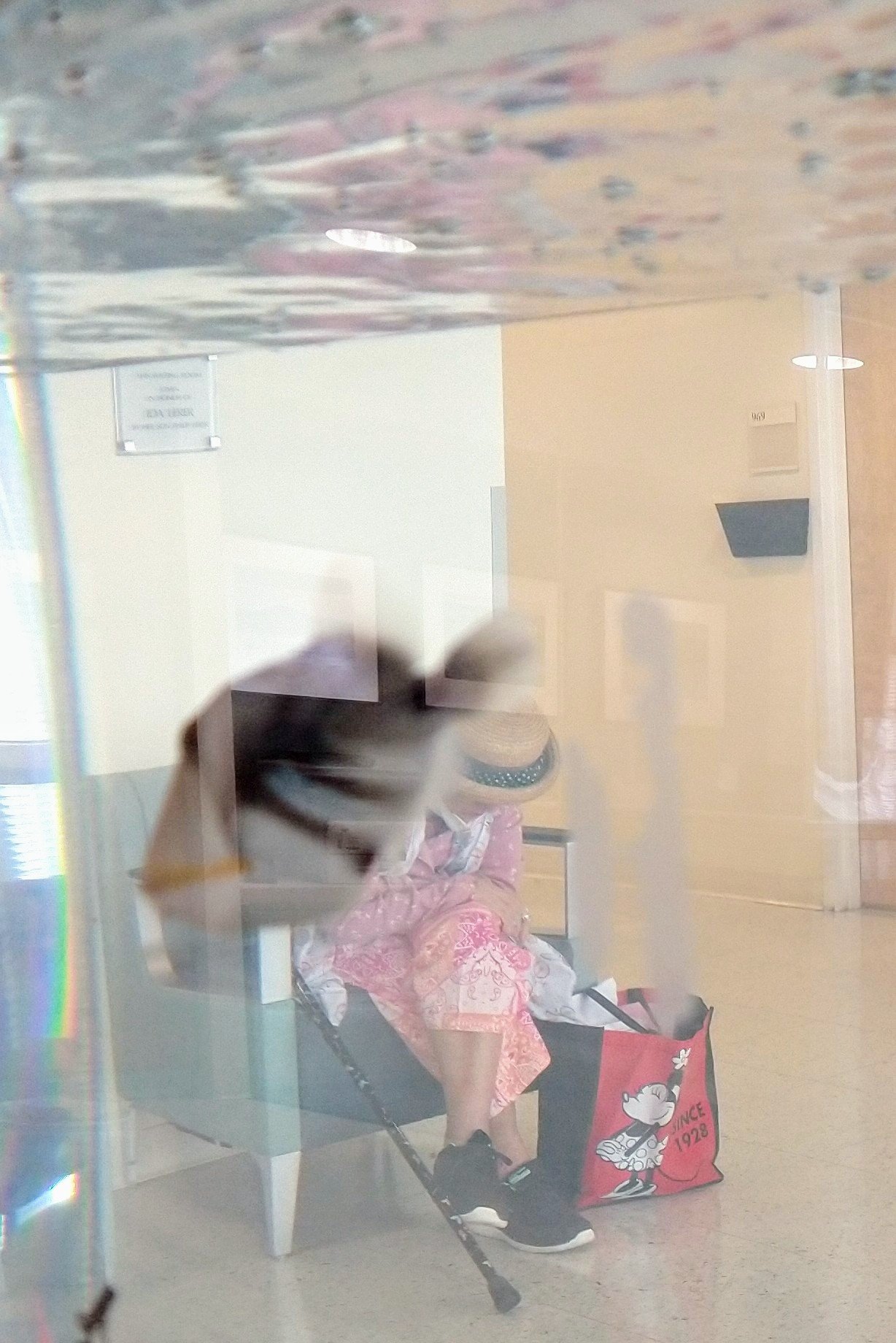Palo Alto neurologist Kendra Peterson's poem “Difficult Patient” (Fall 2017 Intima: A Journal of Narrative Medicine), and the patient who inspired my “American Sonnet for an Addict” (Fall-Winter 2025-26 Intima) are prototypical victims of name-calling – a ubiquitous clinical behavior taught exclusively in the so-called hidden curriculum of medical education. These patients are our albatrosses, another name we ascribe, recalling the curse that befell the entire ship’s crew of Samuel Taylor Coleridge’s famous mariner following his killing of an albatross in the poem, “The Rime of the Ancient Mariner.” They curse us. They burden and encumber us.
Read moreWhat is Grief-Sight? Writer and researcher Valk Fisher reflects on what prompts it.
I began to see grief everywhere.
A diagnosis started it, though I didn’t know, exactly, what I was seeing. I had no words for the gnawing inside my gut, the tightness beneath my sternum, the exhales that were just that much heavier. Grief was everywhere, but nameless. It became larger and louder until I could sense it, name it, be with it, speak about it. Only then did I begin to smile – really smile – again.
Grief will require it be Seen.
Read moreGetting to Say Goodbye: A reflection by patient advocate Holly Cantley
“There is bravery in enduring. There is bravery in leaving.”
Read moreThe Art of Being Here: A Reflection on the Hidden Moments of Care by medical student Tiffany Chen
Medical student Tiffany Chen, author of “Coffee and Crosswords” in the Fall 2024 issue of Intima, shares an appreciation of Kirilee West’s Studio Art pieces in, “The Art of Being Here,” from the Spring 2022 issue. West beautifully depicts “hidden” moments of care, and her artwork shows different providers attending to patients and ensuring they are comfortable even when they are not fully conscious.
Read moreHow to Have Empathy for Others As Well as Ourselves: A Reflection by clinician Jennifer Anderson
As I read Sarah Gundle’s essay “I Can’t Remember His Name” (Intima, Spring 2023), I recognized a young and eager clinician who felt both moved by someone’s story and inept at affecting change, a dissonance that can reverberate throughout decades of practice. I, too, remembered my earliest encounters, when my own therapeutic skin was most supple and soft, vulnerable to the bruising weights of trauma, addiction and injustice. I recognized the writer’s spontaneous tears – and the impulse to minimize and dismiss them in accordance with the guidelines of rational detachment and therapeutic rapport.
Read moreRituals of Care: How We All Possess More Agency in the World Than We Think: A reflection by doctor Gaetan Sgro
There is a tendency in times of upheaval to overestimate the agency of certain individuals. Anxieties engender a cast of heroes and villains making games of global events. But the kernels of truth in these conceptions obscure the relatively small influence such figures exert on our daily lives. Still, there is comfort in the notion that somebody, somewhere, is in charge; perhaps because it suggests that we, ourselves, possess more agency than we perceive and are not, as so often seems, simply adrift on the currents of fate.
Read moreLearning to be Present for an Act of Dying by UCSF Medical Center professor Krishna Chaganti
It is the great privilege of medicine that we are asked to show up, constantly, albeit in a different role than a family member would be. To not look away is in the fabric of what we do. It is partly why the practice of medicine can be exhausting, electronic charting and reimbursement quibbles aside. We are asked as caregivers not to dispense always but to receive, to hear questions that we don’t want to reflect upon. It is our privilege to be present.
Read moreMissing Someone: A Reflection on Loss and Yearning by Shruti Koti
My short story “The Waiting Room” (Spring 2024 Intima) was inspired by recent legislation that threatens women’s rights and health. In the story, a young couple is troubled by a decision they made to terminate a pregnancy – they are scared of persecution and legal action, but they are also emotionally and spiritually haunted by their choice.
The story ends as they drive away from the reproductive clinic, but it is evident they will think about that afternoon for months, and years, to come.
Can one miss something that was barely there?
Read moreA Sestina in Honor of Tia Forsman’s “Remnant” by Lynn Lawrence
“Radiographs serve as distilled moments of a human narrative,
An illness experience in greyscale” (From “Remnant” by Tia Forsman in the Spring 2022 Intima)
Sea glass/cutglass/eyeglass/stonefish/boomerang, Forsman’s remnants
Arrayed/x-rayed on the nightblack ocean floor of shapes and shadows.
From the French : to “rest”; to “remain”, “left over”; an underwater x-ray.
Overlapping, edges blurred, tenderly floating in an uncertain narrative.
This isn’t an x-ray. It just looks like one. Like medicine, a “grey area”
Forman is bilingual.. She paints in watercolor. She speaks in radiology.
It’s Happening to Me, Too: Reflections on Interconnectedness, Interdependence, and Independence in Caregiving Relationships by Leena Ambady
“Every thought begins with I. This is happening to him, I try to say,
not happening to me. But it is, too. This is my place to tell it.”
The above is an excerpt from Kristin Camitta Zimet’s “A Dialysis Diary,” (Intima, Fall 2023). In this beautiful essay, Camitta Zimet writes about her husband’s end-stage kidney disease, the initiation of dialysis, and the impact that his chronic condition and the treatment it required had both on her and her relationship.
Read moreWe’re Invisible, Too: Showing Respect for Healthcare Workers by Cheryl Bailey
A retired gynecologic oncologist reflects on her own career and realizes how watercolor artwork can allow for even healthcare providers to be seen.
Read moreFear and Compassion: At the Heart of Panic Attacks by Lisa H.D. Napolitan
© How a Heart Grows. Susan Baller-Shepard. Fall 2018 Intima
Fiction and visual art are a natural pairing, one digging deep through words, the other a profound visual exploration. Both genres allow ways to explore the issue of mental health.
Read moreListening to Beethoven: A Reflection on Professional Responsibility and Personal Recognition by poet Susan Carlson
“I like Beethoven the best!” is a declaration made by a patient of Mitali Chaudhary, as she readies to leave his hospital room. A busy senior medical resident at the University of Toronto, Chaudhary juggles many demanding responsibilities with her desire to get to know this elderly patient. In her Field Notes essay titled “Beethoven’s Symphony No. 5,” published in Intima’s Fall 2023 issue, she recalls how she’d tried to get her patient to respond to questions about symptomatology, all the while aware that twenty-three other patients – along with a group of junior residents and medical students – were awaiting her time and attention. In that moment, she finds herself turning away from an opportunity for a personal interaction with him in order to ensure she manages her tasks appropriately.
Read moreEndurance and Gratitude: A reflection on finding joy in difficult moments by Laura Carmen Arena
Both Karen George’s poem, and my “Triptych:Oncology Fish,” share an expression of admiration for the resplendent inner strength in our loved ones, emanating despite the foreboding shadows of illness, suffering and loss. The emotions floating around our lived spaces as our loved ones endure and battle disease in the face of difficult circumstances move in many directions including grieving, reflecting, hoping, enduring and celebrating, colors that shift and radiate with the heroically hopeful, illuminating presence of gratitude and love.
Read more"Reading" Patients When Illiteracy is What Afflicts Them: A reflection by medical oncologist Jose Bufill
While returning to the U.S. on an international flight not long ago, I sat next to a young African woman. As we approached our destination, she sheepishly passed me her passport and a customs form. Since I was in the aisle seat, I assumed she wanted me to pass it along to the flight attendant, until I realized the form was blank. She was asking me to fill it out.
Read moreThe Thing About ‘Good News’ at the Doctor’s Office by neuropsychology postdoc fellow Sarajane Rodgers
In theory, whenever we go to the doctor, most of us want to hear “good news.” The test is negative. You don’t have ___. Your results are inconsistent with ___. There are times where we take that in and walk away with an emotional weight removed. Other times, we are left with a void. The diagnosis we thought we could hang a hat on is taken away. Now where do we put our hat?
Read moreWhat Clown Doctors See and Don't See: A Look at Healthy Humor by Phyllis Capello
Phyllis Capello, who is a writer and musician, is a NYFA fellow in fiction I and a winner of an Allen Ginsberg Poetry Award. Her collection “Packs Small Plays Big” is from Bordighera Press, 2018. Cantastoria work (sing/storyteller) has taken her from Ireland-to-Istanbul. She has presented at the International Oral History Conference in Rome, Italy and has been a musician/clown since 1990 with Healthy Humor Red Nose Docs, as well as a member of the poetry/activist trio, The Ferlinghetti Girls. ferlinghettigirls.com In 2023 she was honored with People’s Hall of Fame Award for teaching artistry for her work in New York City schools. Her poem “The Ballad of a Harlem Boy” appears in the Fall 2023 Intima: A Journal of Narrative Medicine.
For thirty years, my hospital work (I’m a clown ‘doctor’/musician for Healthy Humor) has included meeting and entertaining families in clinic waiting rooms, Pediatric ICUs, triaged Emergency Departments and in out-patient, in-patient rooms. Clown-doctor encounters can, if invited, also extend to physical therapy and treatment rooms, hallways, nurses’ stations and elevators. In ED and in out-patient and in-patient rooms permission comes from the medical and childlife staff first (and pertains to situational or isolation status). After that, the child’s permission (being our ultimate “boss”) to enter is strictly respected. In a hospital environment, we are one thing a child can prevent from entering their room.
Knowing when to present ourselves and when to exit means we are not often present for the trauma of Emergency Medical procedures unless specifically requested by staff. I do not see the immediate medical aftermath of a bullet wound. The hands of professionals as they seek to save a life as in Kirilee West’s drawing of hands entitled: “6:21 P.M.” That is why the piece really speaks to me of the drama and humanity inherent in the moments before a medical clown can be of any use to a patient.
Her drawing resonates with me as my poem, “The Ballad of a Harlem Boy,” was written after a nurse shared her distress about a child’s death. Telling us (we work in pairs) of her direct experience, I could only think of her hands and their expert ministrations during that terrible time and of the depth of her humanity for the mortally-wounded fourteen-year-old and his mother.
We all want our hands to be of use: I, in my small way, making music or writing poems; medical staff whose hands take on the most difficult and tender of roles; the artist’s hands who can capture with a charcoal stick the enormity of what we might see if, after the fact, we can allow our creativity to take a step back and tell a story.
Phyllis Capello, who is a writer and musician, is a NYFA fellow in fiction I and a winner of an Allen Ginsberg Poetry Award. Her collection “Packs Small Plays Big” is from Bordighera Press, 2018. Cantastoria work (sing/storyteller) has taken her from Ireland-to-Istanbul. She has presented at the International Oral History Conference in Rome, Italy and has been a musician/clown since 1990 with Healthy Humor Red Nose Docs, as well as a member of the poetry/activist trio, The Ferlinghetti Girls. In 2023 she was honored with People’s Hall of Fame Award for teaching artistry for her work in New York City schools. Her poem “The Ballad of a Harlem Boy” appeared in the Fall 2023 Intima: A Journal of Narrative Medicine.
Scripting Death: When Words Fail – In Conversation with Liana Meffert’s “Death is Usually an Easy Diagnosis” by Paula Holmes-Rodman
“A medically assisted death, such as I recount in my essay “Mercies, Or, the Mostly True Tale of a Narratively Assisted Death” (Intima Spring 2023), is the antithesis of a traumatic ending in an ER. It is highly anticipated, fully orchestrated and well rehearsed – on everyone’s part but my own.”
Read moreOn Knowing
A nurse ponders the role of hope in the clinical encounter and whether the holy can be found within the realm of medicine.
Read moreScripting Death: When Words Fail – In Conversation with Liana Meffert’s “Death is Usually an Easy Diagnosis” by Paula Holmes-Rodman
In reading Liana Meffert’s “Death is Usually an Easy Diagnosis,” I was intrigued by her reflections on the learning and limitation of choreographed roles and scripted dialogue in pronouncing death and informing bereaved families.
Read more



